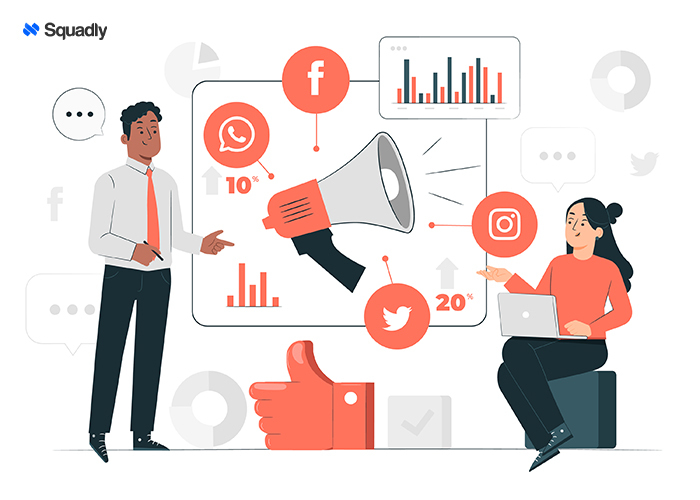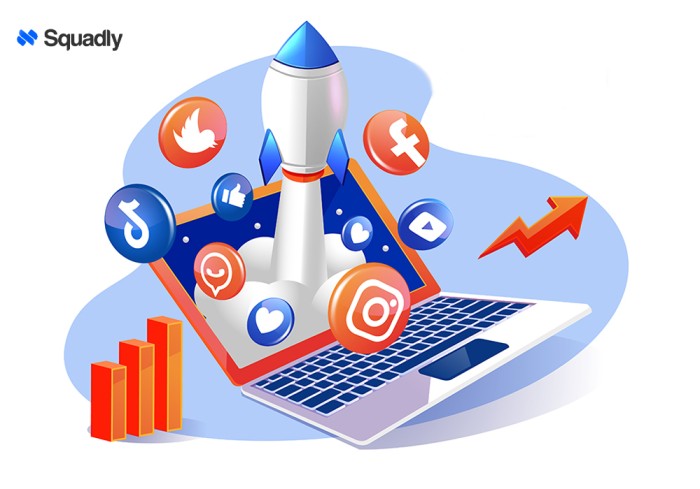In today’s highly competitive business environment, a marketing strategy makes all the difference between success and failure. The business landscape is becoming increasingly competitive, with new entrants and disruptive technologies emerging all the time.
Effective marketing can help businesses to differentiate themselves from competitors, build brand equity, and establish a unique value proposition that resonates with their target audience. In today’s digital age, digital marketing has become an essential part of any business strategy.
In this blog, we will explore what marketing is and why it is important for businesses. We will comprehensively discuss what is digital marketing and how it plays a vital role in the current business landscape. Readers will get to learn practical techniques and tips to market their businesses as beginners.
What is Marketing?
Marketing is an essential part of any business strategy. It involves creating, communicating, and offering products and services that have value for customers, clients, partners, and society at large.
- Marketing involves promoting and selling a product or service to the masses through various channels and techniques.
- Increases brand awareness, attracts new customers and retains existing ones.
- It involves identifying the needs and wants of a target audience and creating a product or service that meets those needs. Once the product or service is created, marketing involves promoting it through various channels such as advertising, public relations, and sales.
- Marketing is significant for retaining existing customers. By maintaining regular communication with their customers and providing them with relevant and personalized content, businesses can keep their customers engaged and satisfied. This can lead to increased loyalty and repeat business.
Businesses are able to stay ahead of the competition through marketing strategies. By analyzing the market and identifying trends, businesses can stay ahead of the competition and develop new products and services that meet the changing needs of their target audience. Effective marketing can also help businesses to differentiate themselves from their competitors and stand out in a crowded market.
What is Digital Marketing?
Digital marketing is a modern marketing strategy that utilizes electronic devices and the internet to promote products or services. It is the promotion of brands, products or services via various digital channels such as search engines, social media, email, mobile applications, and websites.
Digital marketing helps businesses reach a wider audience, measure their performance, and ultimately increase their revenue.
Most marketers and business owners across North America and the UK consider digital marketing and inbound marketing to be the same. However many field specialists and business gurus regard the minor differences between the two through field experiences.
Why Digital Marketing?
The reality is that the consumers now expect and depend on digital content and marketing as a means of learning about brands because it is so widespread. You can get inventive and test out different marketing strategies on a tight budget because there are so many opportunities out there with this type of marketing.
In the broad sense, digital marketing is best described as the use of a variety of digital strategies and platforms to engage with clients where they spend a large amount of time online. The most effective digital marketers can clearly see how each strategy helps them achieve their main objectives. Marketers can support a bigger campaign using the free and paid platforms at their disposal, based on the goals of their marketing strategy.
Basics of Digital Marketing:
Search Engine Optimization (SEO)
SEO is the process of optimizing a website to rank higher in search engine results pages (SERPs). It involves creating relevant content, optimizing website structure, and building backlinks to increase website traffic.
Pay-Per-Click Advertising (PPC)
PPC advertising is a form of digital marketing where businesses pay for each click on their ads. PPC ads appear at the top of search engine results pages and can be targeted to specific demographics.
Social Media Marketing (SMM)
SMM involves using social media platforms such as Facebook, Twitter, and Instagram to promote a brand, product or service. It involves creating engaging content, building a social media following, and responding to customer queries.
Email Marketing
Email marketing involves sending promotional emails to a targeted audience. It is a cost-effective way to reach customers and build customer loyalty.
Content Marketing
Content marketing involves creating valuable content such as blog posts, videos, and infographics to attract and engage customers. It helps build brand awareness, increase website traffic, and drive sales.
Mobile Marketing
Mobile marketing involves promoting a brand, product, or service via mobile devices such as smartphones and tablets. It includes mobile applications, SMS marketing, and mobile-responsive websites.

How Can Digital Marketing Be Helpful For Businesses?
There are numerous benefits of digital marketing that businesses can leverage to reach their target audience and grow their business.
Build & Grow Your Brand
With digital marketing, businesses can reach a larger audience than with traditional marketing methods. Social media, search engines, and other digital platforms allow businesses to reach potential customers who might not have known about their product or service otherwise. This increased visibility can help to build brand awareness and recognition, which can lead to more sales and growth.
Run With Limited Resources Anyway
Digital marketing is often more cost effective than traditional marketing methods. Many digital marketing channels, such as social media and email marketing, are free to use. Paid advertising, such as pay-per-click (PPC) advertising, can be targeted to specific audiences, making it more cost effective than traditional advertising methods such as television or print advertising.
Better Targeting
Digital marketing allows businesses to target specific audiences based on their interests, behaviour, and demographics. This targeting allows businesses to create more relevant and personalized messages, leading to higher engagement and conversions.
Engage With Your Customers
Digital marketing channels, such as social media and email, allow businesses to engage with their audience in real time. This engagement can help to build relationships with customers and increase brand loyalty. By responding to customer feedback and questions, businesses can also gain valuable insights into their target audience’s needs and preferences.
Better Sales Conversions
Digital marketing can help to increase conversions by driving traffic to a business’s website or online store. By optimizing the user experience on their website, businesses can encourage visitors to take action, such as making a purchase or filling out a contact form. The ability to track and analyze user behaviour through tools such as Google Analytics also allows businesses to identify areas for improvement and increase their conversion rates.
Greater Scalability
Digital marketing provides businesses with measurable results. Analytics tools, such as Google Analytics, allow businesses to track website traffic, engagement, and conversions. This data can be used to optimize marketing campaigns and improve ROI.
More Flexibility
Digital marketing allows businesses to be more flexible in their marketing efforts. Campaigns can be quickly adjusted and optimized based on the data and insights gained from analytics tools. This flexibility allows businesses to respond quickly to changing customer needs and stay ahead of the competition.
8 Practical Tips & Techniques For Beginners
Digital marketing can be overwhelming for beginners, but with the right strategies and tips, it can be an effective tool to grow your business. Here are some tips and strategies for beginners to get started with digital marketing:
1. Determine Who You Want To Serve
The first step in creating a digital marketing strategy is to define your target audience. Understand their needs, preferences, and behaviours, and tailor your messaging accordingly. This will help you create content that resonates with your audience and increases engagement.
2. Develop a Content Strategy
Develop a content strategy that aligns with your target audience’s interests and needs. Create content that is informative, engaging, and relevant to your audience. You can use a variety of formats, such as blog posts, videos, infographics, and social media posts.
3. Optimize Your Website
Your website is the hub of your digital marketing strategy. Optimize it for search engines by using relevant keywords, creating quality content, and ensuring it’s mobile-responsive. A well-designed website can improve user experience, increase engagement, and ultimately drive conversions.
4. Use Social Media
Social media is a powerful tool for digital marketing. Choose platforms that align with your target audience and create engaging content that resonates with them. Use social media to build a community, promote your products or services, and drive traffic to your website.
5. Reach To Their Inboxes
Email marketing is a cost-effective way to communicate with your audience. Develop an email list and send regular newsletters, promotions, and updates to keep your audience engaged. Use personalization and segmentation to ensure your emails are relevant to your audience.
6. Invest in SEO
Search engine optimization (SEO) is the process of improving your website’s visibility in search engine results pages (SERPs). Invest in SEO to improve your website’s ranking in search engines, increase organic traffic, and ultimately drive conversions.
7. Use Paid Advertising
Paid advertising, such as pay-per-click (PPC) advertising, can be a powerful way to drive traffic to your website and increase conversions. Use platforms such as Google Ads or social media advertising to target your audience and drive sales.
8. Know What Works & What Doesn’t
Analyze your digital marketing results regularly to understand what’s working and what’s not. Use analytics tools such as Google Analytics to measure website traffic, engagement, and conversions. Use this data to refine your strategy and improve your results.
Is Digital Marketing The Right Answer For You?
Digital marketing can be an effective strategy for many businesses, but it may not work for everyone. The success of digital marketing depends on several factors, including the nature of the business, the target audience, the goals of the marketing campaign, and the resources available to the business.
Mode of Business
For some businesses, such as e-commerce companies or businesses that primarily operate online, digital marketing can be a highly effective strategy. These businesses can leverage digital marketing channels such as social media, email marketing, and search engine optimization (SEO) to reach a wide audience and drive sales.
However, for businesses that operate primarily offline or have a more niche target audience, digital marketing may not be as effective. In these cases, traditional marketing methods such as print advertising, radio or television ads, or direct mail may be more appropriate.
Different Goals
It’s also important to consider the goals of the marketing campaign when deciding whether digital marketing is the right strategy. If the goal is to increase brand awareness or engage with customers on social media, digital marketing can be highly effective. However, if the goal is to drive immediate sales, traditional marketing methods such as in-store promotions or direct mail may be more effective.
Limitation of Resources
Finally, the resources available to the business also play a role in the effectiveness of digital marketing. While digital marketing can be cost-effective compared to traditional marketing methods, it still requires a significant investment of time, resources, and expertise to execute effectively. If a business does not have the necessary resources or expertise to execute a digital marketing campaign, it may not be as effective as traditional marketing methods.
To Sum It Up
Marketing is an essential part of any business strategy. It involves creating, communicating, and offering services and products that have value for customers, clients, partners, and society at large. Digital marketing is an essential component of modern business. It enables businesses to reach a wider audience and ultimately increase revenue. By utilizing various digital channels such as SEO, PPC, SMM, email marketing, content marketing, and mobile marketing, businesses can create personalized messaging and engage with their customers in real time. The success of digital marketing depends on factors like the nature of the business, the target audience, the goals of the marketing campaign, and the resources available to the business.



